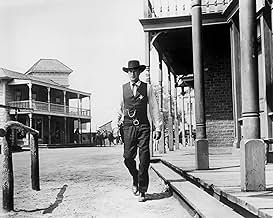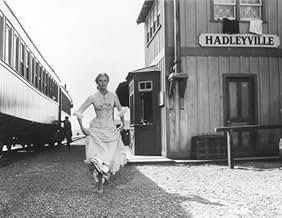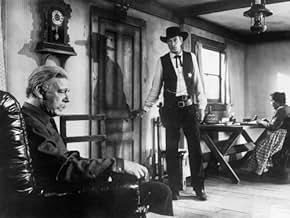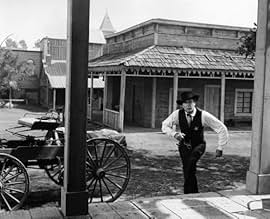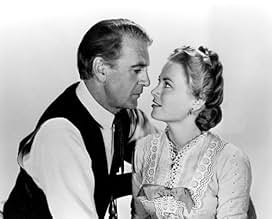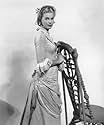Un oficial se enfrenta a una banda de asesinos a cuyo líder fue exiliado de su pueblo años atrás.Un oficial se enfrenta a una banda de asesinos a cuyo líder fue exiliado de su pueblo años atrás.Un oficial se enfrenta a una banda de asesinos a cuyo líder fue exiliado de su pueblo años atrás.
- Dirección
- Guionistas
- Elenco
- Ganó 4 premios Óscar
- 18 premios ganados y 12 nominaciones en total
Lon Chaney Jr.
- Martin Howe
- (as Lon Chaney)
Harry Morgan
- Sam Fuller
- (as Henry Morgan)
Robert J. Wilke
- Jim Pierce
- (as Robert Wilke)
Ernest Baldwin
- Townsman
- (sin créditos)
Benjie Bancroft
- Church Member
- (sin créditos)
- Dirección
- Guionistas
- Todo el elenco y el equipo
- Producción, taquilla y más en IMDbPro
Opiniones destacadas
The summer temperature soars, as does the tension during the hour before the arrival of the midday locomotive that will bring with it a vengeful gunslinger to settle an old score with the Marshal: who will soon discover who his friends are.
Vengeance, treachery, ignorance, justice and survival - concentrated around the barrel of a gun.
Vengeance, treachery, ignorance, justice and survival - concentrated around the barrel of a gun.
High Noon is one of the most loved films of all times thanks to the elements that came together to make it the classic that it is. The movie owes a lot to Fred Zinnemann for his tight account of this story by Carl Foreman. The film benefits from Dimitri Tiomkin's great score and the great cinematography by Floyd Crosby.
This is a film that packs a lot of symbolism because of the times when it was done. Those were the days of the communist hysteria where many people in the industry were accused, tried and lost jobs because when they faced the HUAC and Senator Joseph McCarthy.
Gary Cooper plays a man who is decent enough to return to the town where he just has gotten married and has finished his tour of duty. His conscience doesn't let him leave his post as he delays his plans and goes back to defend the town from the bandit who's been freed by Northern judges, and is coming back to seek revenge from Marshal Kane and the town.
Gary Cooper embodied the all Amercian hero. He was an actor who could do no wrong, as he proves in his take of Marshal Kane. We see him as the clock is ticking away toward noon time when the train will arrive in Hadleyville. We see him perspire as he goes around trying to get people help him deal with the problem, to no avail; he will have to do it himself. In the process, he clearly disappoints his new bride, who is horrified at the prospect of losing the man she clearly loves.
Grace Kelly was such an elegant figure that it's hard to imagine she would be in Hadleyville at all! Katy Jurado was also excellent as the jaded Helen Ramirez, the woman who owned a lot of businesses in town. Also effective, Thomas Mitchell, as the mayor of the town and Lloyd Bridges, as Harvey.
This is a film to treasure.
This is a film that packs a lot of symbolism because of the times when it was done. Those were the days of the communist hysteria where many people in the industry were accused, tried and lost jobs because when they faced the HUAC and Senator Joseph McCarthy.
Gary Cooper plays a man who is decent enough to return to the town where he just has gotten married and has finished his tour of duty. His conscience doesn't let him leave his post as he delays his plans and goes back to defend the town from the bandit who's been freed by Northern judges, and is coming back to seek revenge from Marshal Kane and the town.
Gary Cooper embodied the all Amercian hero. He was an actor who could do no wrong, as he proves in his take of Marshal Kane. We see him as the clock is ticking away toward noon time when the train will arrive in Hadleyville. We see him perspire as he goes around trying to get people help him deal with the problem, to no avail; he will have to do it himself. In the process, he clearly disappoints his new bride, who is horrified at the prospect of losing the man she clearly loves.
Grace Kelly was such an elegant figure that it's hard to imagine she would be in Hadleyville at all! Katy Jurado was also excellent as the jaded Helen Ramirez, the woman who owned a lot of businesses in town. Also effective, Thomas Mitchell, as the mayor of the town and Lloyd Bridges, as Harvey.
This is a film to treasure.
...a quote from Men in Black that applies here if it ever applied anywhere.
Gary Cooper plays marshal Will Kaine, who turns in his star immediately after he marries Amy, a Quaker girl (Grace Kelly). Upsetting the celebration is the news that killer Frank Miller is due on the noon train and his first order of business is to kill Kaine, a man who Kaine helped send to prison five years ago and swore blood vengeance at the time. The three members of his gang are waiting at the depot. Miller escaped hanging, got a long sentence, and some knuckleheads on the parole board have turned him loose. At first Kaine is with the popular sentiment - Run!. But then he realizes that Miller will lay waste to the town if he isn't there - the new marshal isn't due in until the next day - plus Miller will hunt him down wherever he is - Kaine will always be looking over his shoulder.
He goes around looking for deputies to help him make his stand. Oh, everybody talks about what a good job Kaine did, but nobody stands up for him. They have all kinds of excuses. That a shootout will cause investors from the east and north to think their town is just another shoot em up town, that if Will isn't there Miller will just leave etc. In the end the result is NOBODY stood by him in his hour of need, in spite of the fact that many in the town owed their lives and fortunes to Kaine cleaning up the town.
The best device in this movie - added after a preview called the film dull - is the constant showing of the clock, ticking away the precious minutes Kaine has. And he is a human hero - because you can tell dying is on his mind, running is on his mind, but in the end he stays to face his enemies. The scene towards the end, with him standing in the middle of a dusty abandoned main street as the camera pulls back just to show how alone Kaine is in this battle is iconic.
Where is his wife you might ask? With a ticket in hand to get on the next train out. At least Grace Kelly's character has a reason for her pacifism - her newly found Quaker faith. What she fails to realize is that unless you are willing to be a slave you have to be strong enough that you can afford pacifism.
There are some great performances here. There is Lon Chaney as the old sheriff who Will goes to for help. The old sheriff has the best excuse of all - he is just too old for this. Will would be looking after him instead of himself. Then there is Lloyd Bridges as one of the most unlikeable characters in film history. He's Kane's ex-deputy Harvey Pell and he is a weasel without the cuteness factor. He is tired of living in Kaine's shadow, just a little jealous that Kaine had Harvey's girl before he had her, very resentful that Kaine would not recommend him to be the new marshal. But here is his chance - if Kaine runs, Kaine is no better than he is. That is why he beats Will up trying to put him on a horse towards the end of the film. He doesn't want Will to live, he wants him to run, to somehow prove he is a coward.
And you have to love the townspeople thinking that this will just "all go away" if everybody hides. The first act of the foursome of gunslingers when they hit town is not to kill Kaine, but to smash a store window and take a woman's bonnet that one of the killers fancies - an act of theft. They'll be stealing more than stuff by nightfall if nobody stops them.
Highly recommended.
Gary Cooper plays marshal Will Kaine, who turns in his star immediately after he marries Amy, a Quaker girl (Grace Kelly). Upsetting the celebration is the news that killer Frank Miller is due on the noon train and his first order of business is to kill Kaine, a man who Kaine helped send to prison five years ago and swore blood vengeance at the time. The three members of his gang are waiting at the depot. Miller escaped hanging, got a long sentence, and some knuckleheads on the parole board have turned him loose. At first Kaine is with the popular sentiment - Run!. But then he realizes that Miller will lay waste to the town if he isn't there - the new marshal isn't due in until the next day - plus Miller will hunt him down wherever he is - Kaine will always be looking over his shoulder.
He goes around looking for deputies to help him make his stand. Oh, everybody talks about what a good job Kaine did, but nobody stands up for him. They have all kinds of excuses. That a shootout will cause investors from the east and north to think their town is just another shoot em up town, that if Will isn't there Miller will just leave etc. In the end the result is NOBODY stood by him in his hour of need, in spite of the fact that many in the town owed their lives and fortunes to Kaine cleaning up the town.
The best device in this movie - added after a preview called the film dull - is the constant showing of the clock, ticking away the precious minutes Kaine has. And he is a human hero - because you can tell dying is on his mind, running is on his mind, but in the end he stays to face his enemies. The scene towards the end, with him standing in the middle of a dusty abandoned main street as the camera pulls back just to show how alone Kaine is in this battle is iconic.
Where is his wife you might ask? With a ticket in hand to get on the next train out. At least Grace Kelly's character has a reason for her pacifism - her newly found Quaker faith. What she fails to realize is that unless you are willing to be a slave you have to be strong enough that you can afford pacifism.
There are some great performances here. There is Lon Chaney as the old sheriff who Will goes to for help. The old sheriff has the best excuse of all - he is just too old for this. Will would be looking after him instead of himself. Then there is Lloyd Bridges as one of the most unlikeable characters in film history. He's Kane's ex-deputy Harvey Pell and he is a weasel without the cuteness factor. He is tired of living in Kaine's shadow, just a little jealous that Kaine had Harvey's girl before he had her, very resentful that Kaine would not recommend him to be the new marshal. But here is his chance - if Kaine runs, Kaine is no better than he is. That is why he beats Will up trying to put him on a horse towards the end of the film. He doesn't want Will to live, he wants him to run, to somehow prove he is a coward.
And you have to love the townspeople thinking that this will just "all go away" if everybody hides. The first act of the foursome of gunslingers when they hit town is not to kill Kaine, but to smash a store window and take a woman's bonnet that one of the killers fancies - an act of theft. They'll be stealing more than stuff by nightfall if nobody stops them.
Highly recommended.
10didi-5
Gary Cooper's greatest role, at 50, as the newly-married sheriff, Will Kane, left to fend for himself against his returning enemies, abandoned by the town he remains loyal to, and played out in real time through its 90 minute running time.
Ably supported by Grace Kelly as his pacifist Quaker wife, who discovers love and right triumphs over long-held preconceptions; Katy Jurado as Kane's former mistress, a fiery Latino type; and Lloyd Bridges as the feisty deputy; Cooper runs away with the acting honours. The theme tune by Tex Ritter is also worthy of note.
High Noon' works because of its tightly written script, its cracking pace and crackling tension. I've seen the film many times and always see something different to notice and admire; still, I'd love to see it again for the first time and not know the twists and turns, not know how it ends. A fabulous film one of the best.
Ably supported by Grace Kelly as his pacifist Quaker wife, who discovers love and right triumphs over long-held preconceptions; Katy Jurado as Kane's former mistress, a fiery Latino type; and Lloyd Bridges as the feisty deputy; Cooper runs away with the acting honours. The theme tune by Tex Ritter is also worthy of note.
High Noon' works because of its tightly written script, its cracking pace and crackling tension. I've seen the film many times and always see something different to notice and admire; still, I'd love to see it again for the first time and not know the twists and turns, not know how it ends. A fabulous film one of the best.
Will Kane (Gary Cooper), the longtime marshal of Hadleyville, New Mexico Territory, has just married pacifist Quaker Amy (Grace Kelly) and turned in his badge. Suddenly, the town learns that Frank Miller (Ian MacDonald) -- a criminal Kane brought to justice -- is due to arrive on the noon train. The townspeople refuse to back the sheriff up.
Apparently, this film was intended as an allegory in Hollywood for the failure of Hollywood people to stand up to the House Un-American Activities Committee during the Sen. Joseph McCarthy Red-baiting era. John Wayne actually called the film "un-American", and was still trashing it twenty years later, which is pretty much the highest honor you can receive.
It must have also bothered Howard Hawks, because the "chicken" sheriff led Hawks to make "Rio Bravo", which, surprise, had John Wayne. As an interesting side note, Cooper was conservative, too, but I guess not as much as Wayne or at least not as emotional about it.
The film is called "a western for people who don't like westerns". I can see the point on that, but I do not know how accurate it is. I liked it, and I do not normally like westerns, so I probably should not argue. But I think some westerns are enjoyable by non-western fans, such as "Unforgiven". So "High Noon" is certainly not alone.
I love that the film is in "real time", that its running time is the same length as the actual plot. The only way this could have been better would be to do it with one, continuous shot. However, I suspect they did not have the technology for this, and it would ruin the cinematography. (Hitchkock basically did this with "Rope" with some key edits, but it is much easier when the film happens in a single room.)
Oh, and there is Lloyd Bridges, so young here...
Apparently, this film was intended as an allegory in Hollywood for the failure of Hollywood people to stand up to the House Un-American Activities Committee during the Sen. Joseph McCarthy Red-baiting era. John Wayne actually called the film "un-American", and was still trashing it twenty years later, which is pretty much the highest honor you can receive.
It must have also bothered Howard Hawks, because the "chicken" sheriff led Hawks to make "Rio Bravo", which, surprise, had John Wayne. As an interesting side note, Cooper was conservative, too, but I guess not as much as Wayne or at least not as emotional about it.
The film is called "a western for people who don't like westerns". I can see the point on that, but I do not know how accurate it is. I liked it, and I do not normally like westerns, so I probably should not argue. But I think some westerns are enjoyable by non-western fans, such as "Unforgiven". So "High Noon" is certainly not alone.
I love that the film is in "real time", that its running time is the same length as the actual plot. The only way this could have been better would be to do it with one, continuous shot. However, I suspect they did not have the technology for this, and it would ruin the cinematography. (Hitchkock basically did this with "Rope" with some key edits, but it is much easier when the film happens in a single room.)
Oh, and there is Lloyd Bridges, so young here...
¿Sabías que…?
- TriviaIn 1951, after 25 years in show business, Gary Cooper's professional reputation was in decline, and he was dropped from the "Motion Picture Herald's" list of the top-ten box-office performers. In the following year, he made a big comeback, at the age of 51, with this film.
- ErroresIn a number of scenes there are Pabst Brewing signs seen on the inside and outside walls of the saloon. Although Pabst did brew in 1848, it did so under the name Best and Company and did not change to Pabst until 1889; the 37-star flag suggests the setting dates are between 1867-77.
- Citas
Helen Ramírez: You're a good-looking boy: you've big, broad shoulders. But he's a man. And it takes more than big, broad shoulders to make a man.
- ConexionesEdited into Darkness at High Noon: The Carl Foreman Documents (2002)
- Bandas sonorasHigh Noon (Do Not Forsake Me, Oh My Darlin')
Music by Dimitri Tiomkin
Lyrics by Ned Washington
Performed by Tex Ritter
[Played over the opening title card and credits; excerpts played throughout the movie]
Selecciones populares
Inicia sesión para calificar y agrega a la lista de videos para obtener recomendaciones personalizadas
Detalles
- Fecha de lanzamiento
- País de origen
- Idiomas
- También se conoce como
- High Noon
- Locaciones de filmación
- Productora
- Ver más créditos de la compañía en IMDbPro
Taquilla
- Presupuesto
- USD 730,000 (estimado)
- Total a nivel mundial
- USD 217
- Tiempo de ejecución
- 1h 25min(85 min)
- Color
- Relación de aspecto
- 1.37 : 1
Contribuir a esta página
Sugiere una edición o agrega el contenido que falta




